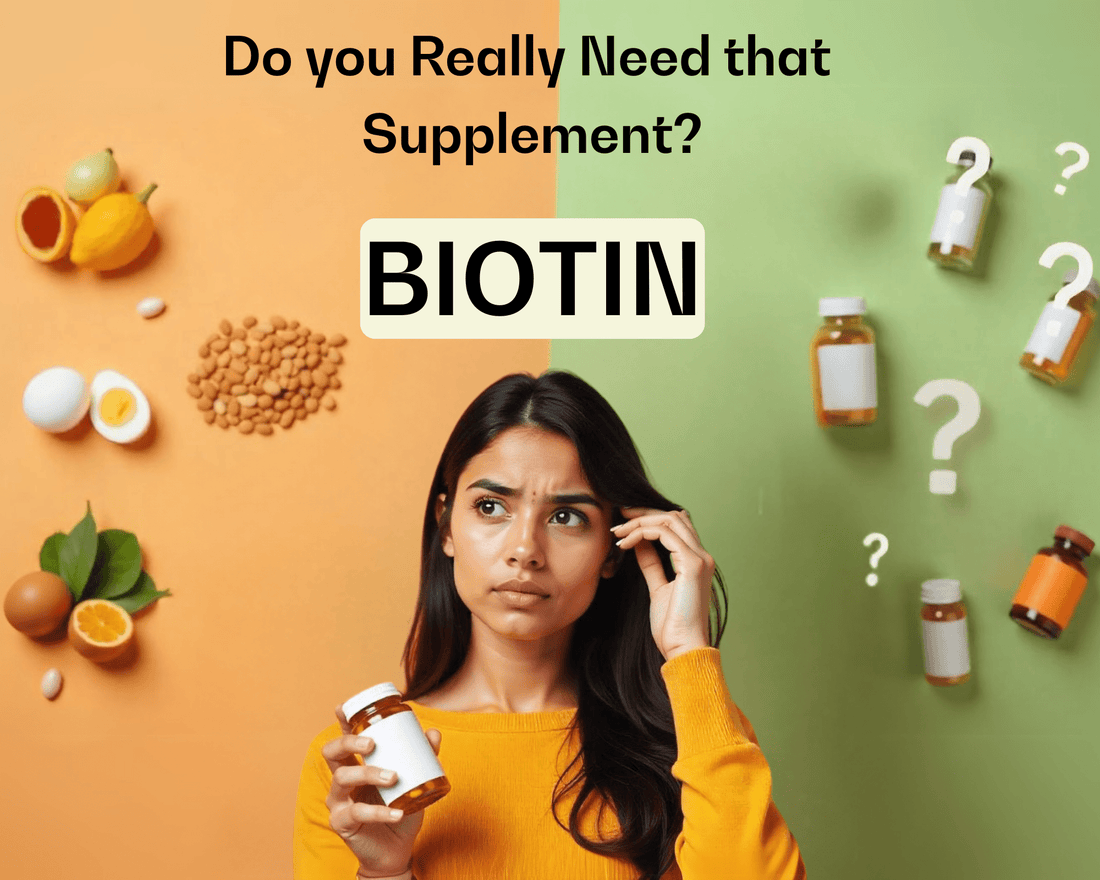
Do you Really Need That Supplement - BIOTIN
SHAILENDRA YADAVShare
I used to think hair fall was just a “seasonal thing.”
You know — those months when clumps of hair seem to clog the shower drain and no amount of oiling seems to help.
So, like many people, I reached for a bottle of biotin. “Good for hair,” it said. It was affordable, everywhere, and even Instagram recommended it. I didn’t really know if I needed it. But hey, what could go wrong?
A few weeks in, nothing drastic happened. My hair didn’t magically stop falling. My skin didn’t glow. But what I did start to notice was how many of my friends were doing the same — buying biotin without checking if they were deficient in it at all.
That’s when I started to look deeper:
- Was biotin really the magic solution for hair fall?
- What does it actually do in the body?
- And how do you know if you need a supplement?
In this blog, I’ll break it down —
- What biotin actually is
- How much your body needs
- Natural sources vs. supplements
- What science says about hair growth
- And whether you really need that bottle of biotin or not
1. What is Biotin, Really?
Biotin, also known as Vitamin B7, is a water-soluble B-vitamin that plays a crucial role in converting food into energy.
It's also important for:
- Fatty acid synthesis
- Amino acid metabolism
- Cell growth
Your body needs it in tiny amounts, and it’s involved in keeping your hair, skin, and nails healthy — which is where the hype around hair growth comes in.
2. How Much Biotin Do You Actually Need?
According to the National Institutes of Health, the recommended daily intake is:
- Adults: ~30 micrograms/day
- Pregnant women: ~30 mcg
- Breastfeeding women: ~35 mcg
Psst: Most people already get this amount through a regular diet.
3. Natural Sources of Biotin
Biotin is widely available in common foods, such as:
- Egg yolks (cooked)
- Nuts & seeds (almonds, peanuts, walnuts, sunflower seeds)
- Legumes (peanuts, soybeans)
- Chicken / Beef liver
- Whole grains
- Spinach, broccoli
- Bananas, avocados
- Dairy products
So unless your diet is extremely restricted, you're likely covered.
4. Biotin Craze in India: Where Did It Start?
Today, biotin supplements are found in everything from hair gummies to protein powders to shampoos. Influencers, dermatologists, and even your local chemist will recommend it for:
- Hair fall
- Nail brittleness
- Skin glow
But most people never get their biotin levels tested — because deficiency is rare and usually caused by:
- Poor diet over a long period
- Alcoholism
- Pregnancy (sometimes)
- Biotinidase deficiency (a rare genetic condition)
5. Does Biotin Actually Help with Hair Loss?
What science says:
- Biotin helps with hair growth — only if you're deficient.
- Most people who see results were either deficient or malnourished.
- Healthy individuals with normal levels don’t get noticeable hair growth with supplementation.
Study Example: A review in the Journal of the American Academy of Dermatology (2017) found limited evidence of biotin helping hair growth in healthy individuals.
6. What Should You Do Instead?
- Eat a balanced diet rich in biotin-rich foods.
- Get your nutrient levels checked before starting any supplements.
- Focus on overall gut and metabolic health, which affect hair quality more than one vitamin.
7. So, Do You Really Need That Biotin Supplement?
Maybe — but probably not. If your diet is decent and you're not facing chronic health issues, your body’s likely already getting enough.
Taking more won’t hurt (biotin is water-soluble and excess is excreted), but it might not help either.
FAQs
Only if you're deficient. Otherwise, the effect is likely placebo or minimal.
Blood tests can help, but deficiency is rare. Symptoms include thinning hair, brittle nails, and skin rashes.
A regular exercise routine and a balanced diet which includes eggs (cooked), nuts, legumes, bananas, spinach, and whole grains.
Always consult your doctor and take supplements accordingly.
Yes! Peanuts and peanut butter are naturally rich in biotin — a B-vitamin essential for hair, skin, and overall metabolism. Just 50g of roasted peanuts can contain 8–10 micrograms of biotin, making it a great plant-based source.








